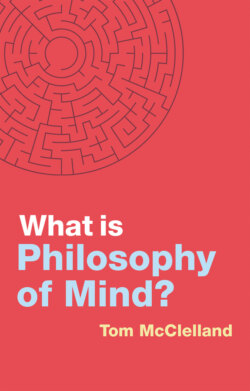Читать книгу What is Philosophy of Mind? - Tom McClelland - Страница 7
1 The Mind and Its Problems 1.1 Philosophizing about the Mental
ОглавлениеSo what is philosophy of mind? Well, we all know what a mind is. Everyone has one, after all, and nothing could be more familiar to us than the contents of our own mind. Putting into words exactly what it means to have a mind can be very tricky, as can describing the different kinds of thing that happen in the mind. But we at least have some intuitive grip on the mind and on a whole host of familiar mental phenomena like perceptions, pains, beliefs, desires, emotions and intentions. We also know what philosophy is. Philosophy is the discipline that asks the big questions about life, the universe and everything. It asks metaphysical questions about the nature of reality, epistemological questions about our knowledge of reality, and normative questions about the value of things in reality. It grapples with these questions by challenging our most basic assumptions, analysing our most foundational concepts and constructing a clear and coherent framework for thinking about the world.
Putting this together, we can describe philosophy of mind as a sub-discipline that investigates the mind philosophically. It asks metaphysical questions about what the mind is, about which things have minds and about how the mind fits into reality. It asks epistemological questions about how we know what’s going on in our own minds and how we know about other minds. It even asks some normative questions about the value of having a mind and about how things with minds ought to be treated. And philosophy of mind deals with these questions by challenging our everyday assumptions about mental phenomena, probing the concepts we use to describe those phenomena and developing a better framework for thinking about the mind and its place in nature.
Philosophy is not, of course, the only discipline that has the mind as its target. The cognitive sciences are an interconnected family of disciplines that investigate the mind and mental phenomena. Cognitive science encompasses neuroscience, psychology, linguistics, artificial intelligence (AI) and aspects of anthropology. Given how successful these disciplines have been at providing insights into the mind, one might wonder what philosophy has to offer. Why not just hand over the big questions to cognitive scientists and give philosophers the day off? The answer is that these disciplines aren’t in a position to deal with the kinds of question raised by the philosophy of mind.
Any scientific investigation of the mind will be built upon metaphysical assumptions: assumptions about what the mind is, about how the mind relates to the brain, and about the nature of specific mental phenomena like pain or love. But these are exactly the kinds of assumption that philosophy seeks to critique. Cognitive science also makes epistemological assumptions about the methods we should use to learn about mental phenomena. But these are again precisely the assumptions that philosophers call into question. One objective of philosophy of mind is to determine whether the cognitive sciences are well founded, and this isn’t an objective that can be accomplished by the cognitive sciences themselves. Trying to use cognitive science to justify its own assumptions is like trying to jump on your own shadow – it’s ill-conceived and ultimately futile. Of course, philosophers too will often have to make assumptions, but the difference is that none of these assumptions are built into the fabric of the discipline. For philosophers, everything is up for debate.
Another reason that the cognitive sciences are unsuited to answering philosophical questions is that these questions are so general in scope. Philosophy explores the big picture of how all of our knowledge fits together – what we know from our everyday experiences, what we know from the natural sciences and what we know from the cognitive sciences. But sciences proceed by zooming in on specific regions of the big picture. Each science picks out a special domain, such as language or intelligence, and investigates that domain without worrying too much about how it relates to the rest of the picture. So philosophy of mind again aims to offer something that science cannot: an overall picture of the mind and its place in the world.
None of this is to say that one way of investigating the mind is superior to the other. Philosophy has one role to play and science another. Nor is it to say that philosophy and science must be kept apart. Philosophy can do conceptual work that helps science to succeed and science can yield empirical insights that help philosophers to answer their conceptual questions. Indeed, a driving message of this book is that the history of philosophy of mind is best understood as a centuries-long dialogue between philosophy and science. Exactly how this give-and-take should work is a matter of some debate, but what’s clear is that philosophical questions about the mental are unavoidable and that philosophy has an indispensable role to play in the study of the mind.
